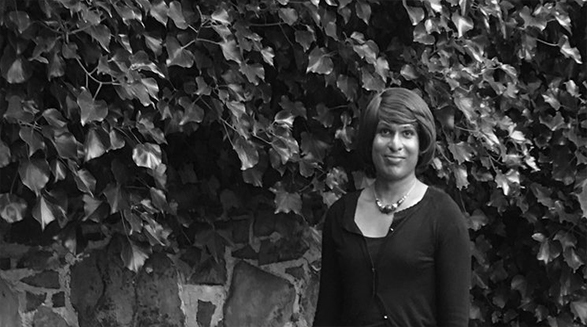Life as a transwoman of colour can be a very challenging and solitary existence
In the patriarchal and gender-biased world we live in, it is extremely challenging for someone assigned ‘male’ at birth, to assume their femininity. Society makes it very hard, almost impossible. A transwoman’s journey to womanhood is one ridden with one challenge after another – which worsen when one is from a visible minority, and with roots in the global South.
My earliest memories are that of asking for things that I found interesting, and being told that they were for girls, and not for me. It is something I never understood, and I would on occasion cry and protest to have my way, just like any other child. My preference for things society classified as being meant for ‘girls’ soon became a problem, a reason for anger and disappointment. My parents put me in an all-boys school, which, in retrospect, turned out to be the toughest part of my life so far. All I wanted was to get away, which I did soon after high school.
Arriving in France for my higher studies, I was initially relieved to find myself at last in a place where I could be myself, without the pressure of conservative attitudes. However, I soon discovered that this was all but a mirage. I ended up in quite a conservative country, where certain privileges of open-minded attitudes were not extended to me. I was catalogued for my ethnicity and national origin – not just by cis-gender heterosexuals, but also on the so-called, ‘gay scene’. I was completely out of place. I would feel very uneasy and unwelcome in both circles, and I was left wondering what on earth was going on.
At a young age, you don’t really have answers to all the questions you are faced with. Exploring responses, finding who I was and what I liked, was a tremendous struggle that took a lot longer. It has been a long and painstaking effort to unlearn what I was told and taught, and to find my true self, the real person within that I always knew I was, but had next to no means of affirming, of being. It was a story of being forced to conform, strictly, to the dictates of a world in which the gender binary had the final say. A life beyond gender assigned at birth was clearly impossible.

The undergraduate years spent in France often involved bouts of anxiety and plunges into depression. I quickly closed up around myself, with my voice subdued and little prospect of moving forward. What was most challenging and painful was not the discrimination, insults and micro-aggressions from cis people, but the difficulty, if not the impossibility of being part of the LGBTQI community, where being a person of colour who was questioning their gender identity happened to be far from welcome. I did what I could, to move around, to surround myself with a lot of material on gender politics, ethnic and racial studies, and activism against racially and socio-economically motivated forms of oppression of people, especially people of colour. This is what eventually made me take stock of the reality that in my struggle, I was not alone.
I subsequently ended up, in a totally unexpected way, in a place called Northern Ireland. To someone with major concerns about their gender identity, sexuality, and as a person of colour with a citizenship from the global South, it is hard to think of a more challenging place to find oneself in Western Europe. The metropolis in Northern Ireland, Belfast, has been changing dramatically since the time I first landed on these shores some ten years ago, but life as a transwoman of colour can be a very challenging and solitary existence.
One of my biggest challenges over the past few years, has been that of reconciling my gender identity with the academic and professional work I am engaged in. Working on a PhD in International Politics in a very conservative university, I found it highly challenging to assume my transwomanhood in the academic sphere. At one point, I seriously considered changing track, abandoning my PhD, and moving over to a ‘gender studies’ department in a different university. There was a time when I couldn’t help seeing things in the eyes of heteronormative society – thinking that my gender identity was going to impede my professional success. It took a great deal of time, effort and energy for me to convince myself that this was in fact not the case, being transgender does not, and should not be seen as an obstacle to career development. After taking some time to pull myself together, I began to see things in a different light. When you land in a place, out of whatever circumstances, where you do not have much space, all it means is that you have to create your own space. I chose this tiresome path of building spaces, a continuing struggle, with its own milestones, successes and indeed, many setbacks.
I generally despise the term ‘transition’, as it does not render justice to this complex process of self-affirmation that trans people undergo. It is a process of affirming, despite the dictates of a society obsessed with the gender binary, who you are. It is much more appropriate to describe it as a process of gender self-determination, which, like any struggle for self-determination, is not straightforward, and marred by one hurdle after another.

I also despise the resolve of healthcare authorities in the United Kingdom to systematically ‘pathologize’ trans identities. It is as if being ‘trans’, or not being comfortable in the ‘cis’ identity you were assigned at birth, is a sickness, a disorder of some sort. I take issue with the way in which trans people are dealt with in the UK health system, which forces people to go through compulsory psychiatrist appointments, perpetuating the view that trans people somehow need to be ‘diagnosed’, and are ‘mentally unwell’. Some trans people, just like cis people at varying stages of life, may indeed require psychological support services, and I certainly appreciate the work done by healthcare professionals in gender identity clinics across the country. However, the system needs to begin to take stock of the fact that quite a few trans people, who have reached clear conclusions about their gender identities, should not be forced to go through the metal health red tape – a process in which trans people are brought to explain and justify their very existence.
I dare say the ailment, or mental disorder, is not in trans people but in a society that revolves around the gender binary. It is society that likes the [thoroughly false and unsustainable] ‘uniformity’ that the gender binary seeks to enforce. Biology, on the other hand, loves difference and diversity. Take any ancient culture and civilisation, and you’ll see the important presence of people of a rich array of gender identities, who upheld traditions and structures of wisdom that the gender binary could never accommodate. Trans identities are not a recent innovation. From where I stand, as someone who moved westwards from South Asia, I also reiterate that trans identities are by no means a ‘Western’ development or some form of ‘trend’.

The former argument is common among anti-trans individuals and groups in the global South, and the latter is often voiced by anti-trans folk in the West. Both groups, in fact, are all but two sides of the same coin of hatred. In the UK, many LGBTQI support groups uphold a strategy for ‘diversity’ which includes providing occasional spaces for people of colour to express themselves. This, in my view, is somewhat inadequate, and is a form of domination in which someone in a position of power gets to determine the parameters of diversity – thereby perpetuating racial and cultural hierarchies in the LGBTQI community.
In a country with such a great deal of diversity in all its forms, it is very important to raise critical questions in LGBTQI circles on anti-oppression, multiple forms of micro-aggression, and the interplay of race, ethnicity and gender plurality. It would be beneficial to everyone to take an approach that centres around the concept of ‘queer liberation’, in which marginalised individuals and groups become the very motors of constructive change, on a platform of equality.
 Dr Chaminda Weerawardhana (www.chamindaweerawardhana.com) is a Belfast-based transwoman, academic and parent, by way of Sri Lanka, France and Germany. Chaminda is currently a Visiting Research Fellow at the School of Politics at Queen’s University Belfast, and is the first transwoman to hold a research title in the university. She is a tireless advocate of gender justice, decolonising gender politics, transfeminism, and indeed, queer liberation. Chaminda blogs at www.chamidefremancourt.wordpress.com
Dr Chaminda Weerawardhana (www.chamindaweerawardhana.com) is a Belfast-based transwoman, academic and parent, by way of Sri Lanka, France and Germany. Chaminda is currently a Visiting Research Fellow at the School of Politics at Queen’s University Belfast, and is the first transwoman to hold a research title in the university. She is a tireless advocate of gender justice, decolonising gender politics, transfeminism, and indeed, queer liberation. Chaminda blogs at www.chamidefremancourt.wordpress.com
Twitter @fremancourt.
Sorry, the comment form is closed at this time.














Pingback: A slice of my life? | de frémancourt